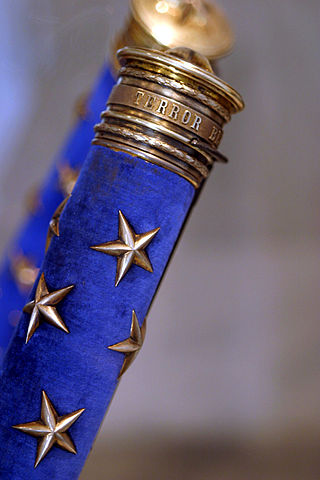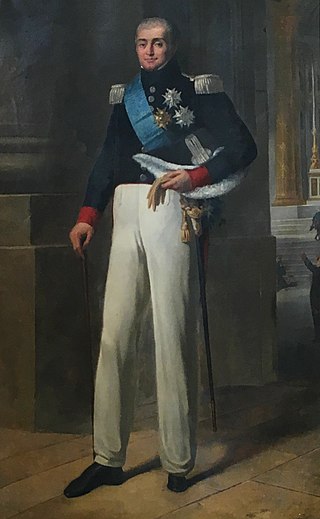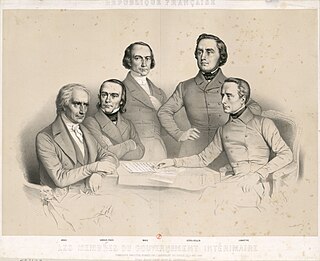
Louis-Eugène Cavaignac was a French general and politician who served as head of the executive power of France between June and December 1848, during the French Second Republic.

Jean-Baptiste Cavaignac was a French politician and statesman.

Marshal of France is a French military distinction, rather than a military rank, that is awarded to generals for exceptional achievements. The title has been awarded since 1185, though briefly abolished (1793–1804) and for a period dormant (1870–1916). It was one of the Great Officers of the Crown of France during the Ancien Régime and Bourbon Restoration, and one of the Grand Dignitaries of the Empire during the First French Empire.

Éléonore-Louis Godefroi Cavaignac, better known as Godefroi Cavaignac, was a French politician and journalist.
Cavaignac is a surname. Notable people with the surname include:

Baron Jean Baptiste Marie Franceschi-Delonne was a French General who served throughout the Revolutionary campaign on the Rhine, took part in the campaign of Zurich in 1799, and distinguished himself very greatly by his escape from, and subsequent return to, Genoa, when in 1800 Masséna was closely besieged in that city. He became a cavalry colonel in 1803, was promoted general of brigade on the field of Austerlitz, and served in southern Italy and in Spain on the staff of King Joseph Bonaparte. During the Peninsular War he won great distinction as a cavalry general, and in 1810 Napoleon made him a baron. He was a prisoner in the hands of the Spaniards, into whose hands he had fallen while bearing important despatches during the campaign of Talavera. He was harshly treated by his captors, and died at Cartagena on 23 October 1810. His name is included on L'arc de Triomphe.

Donatien-Marie-Joseph de Vimeur, vicomte de Rochambeau was a French military commander. He was the son of Jean-Baptiste Donatien de Vimeur, comte de Rochambeau.

Marie-Victor-Nicolas de Faÿ, Marquis de La Tour-Maubourg was a French cavalry commander under France's Ancien Régime before rising to prominence during the First French Empire.

The Executive Commission of 1848 was a short-lived government during the French Second Republic, chaired by François Arago, that exercised executive power from 9 May 1848 to 24 June 1848. It succeeded the Provisional Government of 1848 and was in turn replaced by the Cabinet of General Cavaignac. The members of the Commission acted as collective head of state.

The siege of Luxembourg was a siege by France of the Habsburg-held Fortress of Luxembourg that lasted from 1794 until 7 June 1795, during the French Revolutionary Wars. Although the French army failed to breach the walls of the city, which were renowned as amongst the best in the world, the fortress was forced to surrender after more than seven months.

The Battle of Würzburg was fought on 3 September 1796 between an army of the Habsburg monarchy led by Archduke Charles, Duke of Teschen and an army of the First French Republic led by Jean-Baptiste Jourdan. The French attacked the archduke's forces, but they were resisted until the arrival of reinforcements decided the engagement in favor of the Austrians. The French retreated west toward the Rhine River. The action occurred during the War of the First Coalition, part of the French Revolutionary Wars. Würzburg is 95 kilometres (59 mi) southeast of Frankfurt.

The Army of the Western Pyrenees was one of the Republican French armies of the French Revolutionary Wars. From April 1793 until 12 October 1795, the army fought in the Basque Country and in Navarre during the War of the Pyrenees. After indecisive fighting during the first year of its existence, the army seized the Spanish port of San Sebastián in August 1794. By the time the Peace of Basel was signed on 22 July 1795, the Army of the Western Pyrenees held a significant portion of northeastern Spain.
Events from the year 1813 in France.

Jean-Jacques de Mesmes, comte d'Avaux, vicomte de Neufchâtel (1630–1688) was a French magistrate, intendant of Soissons, and Président à mortier of the Parlement of Paris. He developed the town of Avaux-la-Ville, which is now called Asfeld. He was a member of the Académie française. He was brother of Jean-Antoine de Mesmes, the diplomat, and father of Jean-Antoine de Mesmes, the premier president of the Parlement of Paris.

Alexander Elisabeth Michel vicomte Digeon, fought in the French Revolutionary Wars in the cavalry. He became a general officer during the Napoleonic Wars, fighting in a number of important battles. After 1814, he gave his loyalty to the Bourbon Restoration and briefly served as Minister of War.

François Antoine Louis Bourcier was a French cavalry officer and divisional general of the French Revolutionary Wars and the Napoleonic Wars.
Jacques-Marie or Jacques Marie may refer to:

Events from the year 1812 in France















